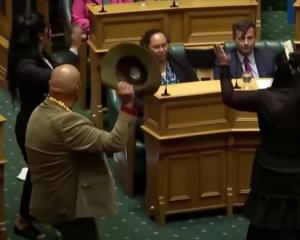It would be simple to label Otago regional councillor Gerrard Eckhoff's opinion piece on race-based local government representation ("New Plymouth's mayor at odds with public'', ODT 18.5.16) as being, in and of itself, racist.
But that would be unfair.
These comments weren't racist, they were simply the comments of someone comfortable in that space described as "middle New Zealand''.
What exactly that is has always eluded me but, growing up as a Maori in "middle New Zealand'' in the '50s '60s and '70s, I became accustomed to receiving the most back-handed of compliments from well-meaning "middle'' New Zealanders.
On discovering that this Pakeha-looking kid who went to a largely white Catholic boarding school and did pretty well academically was actually part Maori, the Pakeha reaction was almost universally, "Ah, but you're not really Maori!''
How was I meant to take that?
I'm OK because I'm one of you?
Well, Cr Eckhoff, I think you nailed it when you wrote: "Patronising sanctimony towards any race of people has no place ahead of understanding the crucial drivers of well-functioning representative democracy.''
Nothing could be more patronising than being told "you're OK now because you're like us''.
This week, I had the privilege of introducing the inaugural Maori Innovation Award at the NZ Hi Tech Awards.
Why, I hear you ask, should Maori have their own category?
Surely if they're good enough they could enter the main awards?
Well, here's how I explained it to an audience of 900, largely Pakeha, leaders of our hi-tech economy.
"Going to school in the 1950s and '60s I learned about Captain Cook and how he discovered this land occupied by a race of head-hunting cannibals.
"No-one told me about the amazing feats of design, engineering and navigation that must have been needed to build that great fleet that sailed across the Pacific Ocean from Hawaiki to Aotearoa.
"No-one told me about the innovation in agriculture and horticulture that must have been needed for our ancestors to adapt to a land that was nothing like the one they had left.
"No-one told me about the fur seal trade routes these same ancestors opened with China long before that free trade agreement we are all so proud of.
"So we Maori kids grew up with no role models to look up to in the world of science innovation and technology, and you wonder why we languish at the bottom of the education stats. Well, tonight, with these inaugural Maori Innovation Awards, we start the journey to change that!''
And, by the way, Cr Eckhoff, we had the largest number of entries ever for a new category.
The entries were stunning and all carried something uniquely Maori.
And one of the finalists entered the main award last year and won.
This year, they were runner-up to the eventual winner of this, the Maori Innovation category.
So I can see how the concept of "one person one vote'' might work when your views are those of the majority.
It's an even better concept when you have been landed with a Treaty signed between your Queen, (Queen Victoria), and the local indigenous people that, rather inconveniently it seems, requires that you treat us as equal partners.
To compare the rights of Maori, on the basis that our ancestors were some of the first people in New Zealand, with the rights of Europeans who emigrated here in those first ships totally ignores the fact that those Europeans (a) arrived in a country already occupied by others and (b) recognised the rights of those indigenous people in a treaty.
When you claim "what is actually at stake is the relationship between the public's widespread and longstanding acceptance of one person one vote and the erosion of that principle by appointed representatives based on ethnicity'', you conveniently lump Maori, the partner in the Treaty we have with the Crown, with all ethnic groups.
Maori have a right to be represented and, if it means that the best way to ensure that representation is to guarantee a place for a Maori on a local body, largely elected by middle New Zealand, then that is the right thing to do.
It is not sufficient that we leave that right of representation for a minority partner to a concept of one person one vote that favours the majority partner.
There is a saying that "voters get the politicians they deserve''.
That is a frightening concept being faced by American voters right now.
Perhaps it's one worth remembering this year as we face our own local body elections.
- Ian Taylor is CEO of Animation Research Ltd.










